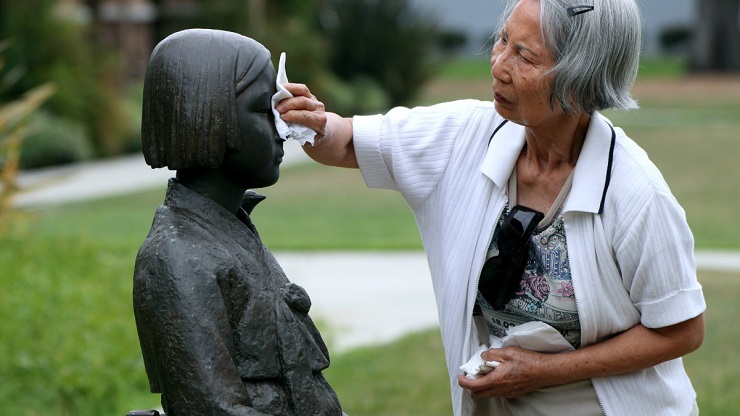Not too long ago, this author wrote about how on September 25, 2020, pro-South Korean activists from Korean Verband put up another monument to comfort women in downtown Berlin and near the Japanese embassy. Under the guise of a sculpture symbolizing the protection of the rights of women victims of wars in Berlin’s Mitte district, another stereotypical “peace girl” appeared. This displeased both the Japanese authorities, for whom such performances are a violation of the 2015 agreement, which Seoul never officially broke (otherwise they would have had to return a billion yen), and the local authorities.
When the deception was uncovered and the Mitte district administration issued a demolition order on October 7, Korea Verband filed a complaint in court, and South Korean “civic activists” resorted to the simple tactic of shouting down their opponents. Although the author was told that the South Korean lobbyists handed out a lot of envelopes in addition to the “anyone who doesn’t support the statue is a fascist and a rapist” PR campaign, let’s talk about the facts.
On November 7, the Mitte Neighborhood Council passed a resolution calling on municipal authorities to repeal the order to remove the statue. 28 votes in favor, 9 against: the peace statue “makes a productive contribution to the debate on sexual violence against women in armed conflict,” and therefore should be allowed to stay.
On November 15, German Ambassador Michael Reiffenstuhl told the Yonhap news agency that Germany considers freedom of expression very important: “Freedom of expression, of opinion, freedom of art and of culture is something very important to us. And this is relevant to everyone who’s in Germany… This freedom of expression also means sometimes one has to live even with expressions or ways of expression that one may not be happy about”. The Korean media saw this as support for their point of view, but the second part of the statement can also be seen as a reprimand to Seoul.
Nevertheless, the ambassador noted that whether to keep the statue will be decided by the local government, and the federal government has no right to interfere, — and it is not a matter of wanting to distance itself from the conflict, but that “this is something that has to be decided by the city and the mayor of the district. From the German side, we very much encourage both countries to try to find ways and means that can overcome the burden that still exists because of their history.”
On November 25, International Day for the Elimination of Violence against Women, local human rights organizations held a rally in front of the monument calling for respect for women’s rights. As it turns out, “Peace Girl” is a testament to crimes against women during the war and a symbol of the fight against such crimes. Participants at the rally expressed solidarity with victims of sexual slavery in the Japanese army by sitting on chairs imitating the “Peace Girl”. In protest against pressure from Japanese and local politicians to tear down the statue, protesters attached cross-shaped stickers to their masks saying that by “trying to tear down the statue in Berlin, the Japanese authorities want to cover up their imperialist history and silence the victims of sexual slavery”.
Pyongyang has also joined the criticism. As the CTAC agency noted in a statement, Japan’s actions are a “shameful act,” especially since historical facts “do not disappear or change when they are denied or distorted.” Pyongyang criticized Japanese Cabinet Secretary General Katsunobu Kato for his remarks at a press conference in Tokyo, calling them “countering the world community’s call for Japan to reflect on its aggressive past.”
On December 1, 2020, the Berlin District Council passed a resolution to preserve the statue. The Mitte Area Legislature then decided to keep Peace Girl in her place until September 2021. 24 of the 29 board members present voted in favor. Speaking to his colleagues, Thilo Urhis of the Left stated that sexual abuse in the army should not be seen as an isolated incident, but as a problem that requires a thorough approach. The “Peace Girl” statue serves as a symbol of this problem, the politician stressed.
The ROK media openly wrote that the situation was initially not in Seoul’s favor (although they deduced the main reason was not forgery but pressure from Tokyo), but “the situation turned out favorable for Korea Verband after it conducted an awareness campaign about the crimes against humanity committed by Japan before and during World War II. The group established connections with civic organizations, both in Germany and in Korea, to protect the statue.”
The Japanese government has voiced its opposition. Cabinet Secretary General Katsunobu Kato expressed regret over this, promising to keep asking Germany to remove the statue. In response, the South Korean media lashed out on Tokyo, calling on it to “stop denying its wartime sexual slavery and other atrocities. Japan should sincerely apologize for its transgressions before it is too late. Otherwise it will not be able to build a friendship and partnership with Korea. It has to face its history.”
But let’s compare the results of the decisive vote with the previous one – 28 votes in favor is more than the 24 at the final meeting, which showed “overwhelming support.” What’s more, it is well known from last year’s vote that there were at least 37 deputies on the council, and this time there were 29. Perhaps, although there was a quorum, those who were against such a decision simply did not show up, and the decrease in real support for the deputies of the legislative assembly was due to the South Korean arm twisting?
Konstantin Asmolov, PhD in History, a leading research fellow at the Center for Korean Studies of the Institute of the Far East at the Russian Academy of Sciences, exclusively for the online magazine “New Eastern Outlook”.

